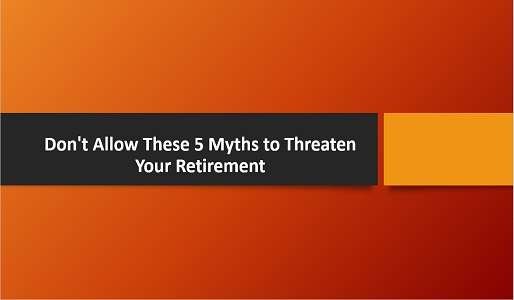Dealing with pensions isn’t something that many find exciting. Consequently, some people remain unaware of how pensions work and the benefits of investing for retirement.
People can become victims of destructive false myths surrounding pensions without reliable information. Such untruths might make good conversation pieces, but believing them can threaten your retirement preparations.
Therefore, this article aims to debunk several of pensions’ most prevalent and dangerous myths.
Five Retirement Threatening Myths
1. “You cannot access your pension funds before retirement.”
Pensions are long-term saving vehicles designed to provide an income when you retire. Therefore you might think this myth has some grounds. Indeed, taking money from your pension pot before retirement could leave you short of income when you stop working.
However, legislation introduced in 2015, known as Pension Freedoms, enables people to access their funds from age 55. Of course, this option doesn’t apply to all pensions. Therefore, you should check your scheme’s status with your pension provider before making any plans for early access.
Even if Pension Freedoms apply to your pension, taking money early might not be your best option. You should consult a regulated financial advisor before making any major decision regarding your pension funds. Check out Portafina.
2. “Pensions don’t require management.”
The principle of a pension is relatively straightforward; you save money each month; it is invested and grows to a size sufficient to support you in retirement. However, pensions are more complex than this. Your money needs to be invested in the right place to maximise its chance to grow. Therefore, using a financial professional to manage your funds is invaluable.
The vast majority of UK pension funds are invested in the stock market, where they experience the most significant returns. However, stock markets can be volatile, moving up and down quickly and without warning.
Therefore, you must have a clear investment strategy. Strategising requires deep knowledge of stock trading and investments. You could severely jeopardise your pension funds through poor investment decisions without such knowledge.
3. “The State Pension is the same for everybody.”
This particular myth is almost true, but not entirely. The amount of money you receive from the State Pension depends upon the National Insurance (NI) payments you have made over your working life.
To receive the maximum State Pension, you must have made 35 years’ worth of NI contributions. However, many people will have gaps in their contributions. For instance, they may be self-employed or have had periods of unemployment, reducing their contributing years.
Therefore, you should check your State Pension entitlement on the gov.uk website.
4. “Your pension is worthless when you die.”
Another aspect of Pension Freedoms was making it easier to pass on your unused pension pot to loved ones upon death. Having worked for many years to build up your pension pot, it is only fitting that it is not lost when you die.
Arranging who should get your unused funds is best sorted out while you are alive. Therefore, you should inform your pension provider of these persons. Whoever receives your pension money will not have any tax implications, as pensions are treated differently than the inheritance of other assets.
5. “Your old workplace pensions will continue to grow.”
If you have changed employers throughout your working life, you could have several old workplace pensions. However, you are unlikely to still be contributing to all of these funds.
Many people make the mistake of thinking these funds will continue to grow without you making further contributions. This is incorrect.
Your old workplace pension funds remain yours. However, losing track of them means they could join the other £19.4 billion of lost UK pension funds. Also, they could be performing better elsewhere. Therefore, you should track down your old pension funds as soon as possible.
Speaking to a regulated financial advisor whenever you change jobs is a good option. They can advise you on the best decisions to maximize your pension funds.
Conclusion
Lack of pension knowledge and misinformation surrounding pensions leads many people to make poor decisions regarding their retirement finances. Hopefully, this article has debunked five pension myths, enabling you to better prepare for your post-working years.
